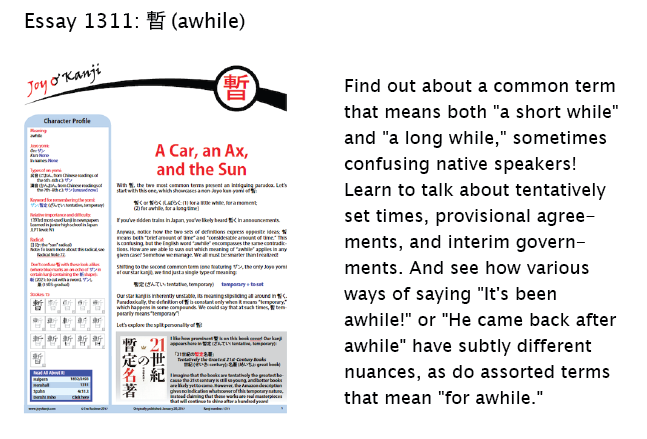Clinging Like a Koala
It's unusual to find a piece of writing that goes to the core of one's deepest concerns. It's rarer still to find writing that reminds you of what your deepest concerns are and perhaps always have been. But that's what I found—or rather what my proofreader found—while researching this word:
ๆณกๆฒซๅ่ฃ (ใปใใพใคใใใป: fringe candidate)
ephemeral (1st 2 kanji) + candidate (last 2 kanji)
I'd never heard of a fringe candidate, but the term refers to someone who runs for election and never stands a chance, disappearing as quickly as bubbles (ๆณก) do! In the last race for Tokyo metropolitan governor, as many as 21 candidates ran, including doctors and journalists. Most contenders were ๆณกๆฒซๅ่ฃ.
This matter has the utmost importance and relevance today, and not because the United States just inaugurated a president that many of us once took to be a ๆณกๆฒซๅ่ฃ. Rather, his election has evoked such deep, multilayered pain for so many people and has ushered in such a dark, depressing era that it's easy to feel an upwelling of existential gloom.
Incidentally, I read quite recently that we're not supposed to use "existential" anymore—that the word makes people's eyes glaze over or something like that. But I don't care. To me, "existential" has always encapsulated the questions and anxieties underlying every endeavor, every choice, every risk, every everything. That word connects to the "Why bother?" issue that has needled me for 35 years.
And quite unexpectedly, an article by a Japanese movie director speaks to those concerns so profoundly that I'm going to share his words with you now, rather than waiting several weeks (as I would ordinarily do) until I post the associated essay, which is on ๆณก (1795: bubble).
The director, ่คๅฒกๅฉๅ (ใตใใใ ใจใใฟใก), wrote the book ใๆณกๆฒซๅ่ฃใ, Fringe Candidate, and the corresponding movie ใ็ซๅ่ฃ (ใใฃใใใป: Candidacy)ใin tandem. He then wrote an article about why fringe candidates choose battles they know they'll lose. Considering that made him contemplate the losing battles he fights in his own life:
็งใฏ่ฒ ใใๆฆใใไปๆใใใใจใใใใใใจใฏๆใใชใใ
I don’t think it’s wrong to choose to fight a losing battle.
็ง* (ใใใ: I); ่ฒ ใใ* (ใพใใ: to lose); ๆฆใ* (ใใใใ: battle); ไปๆใใ (ใใใใ: to pick (a fight)); ใใใใ (not right, wrong); ๆใ (ใใใ: to think)
ใชใใชใใ็ง่ช่บซใใ็ใพใใฆใใๆญปใฌใพใง่ฒ ใใๆฆใใใใฆใใใใใ ใ
I say that because I’m also fighting losing battles, from my birth to my death.
ใชใใชใ (ไฝๆ ใชใ: because); ่ช่บซ (ใใใ: personally); ็ใพใใ (ใใพใใ: to be born); ๆญปใฌ (ใใฌ: to die)
ใ้ใ่ฒฏใใใไฝใ้ใใใๆ ็ปใไฝใใ
I save money, work out, and make movies.
ใ้ (ใใใญ: money); ่ฒฏใใ (ใใใ: to save); ไฝ (ใใใ : body); ้ใใ (ใใใใ: to train); ๆ ็ป (ใใใ: movie); ไฝใ (ใคใใ: to make)
ใใใชใใจใใชใใฆใไธ้ใฎๅทใฏๅฟ
ใๆธกใใใ
Whether or not you do such things, you can invariably cross the Sanzu River to the afterlife.
ใใชใใฆใ (even without doing); ไธ้ใฎๅท (ใใใใฎใใ: Sanzu River, the Buddhist equivalent of the River Styx); ๅฟ ใ (ใใชใใ: invariably); ๆธกใ (ใใใ: to go across, shown here in its potential form)
How interesting that, just as the ancient Greeks crossed the River Styx to the underworld, the Japanese have their own river between life and death. And yet, curiously, I'd never heard of this river before. I've now learned that the Sanzu River has three shallow areas where one can cross, each moving at a different speed. Bad people are told to cross where the current is fastest, semi-flawed people are to cross where the current flows at a medium speed, and good people can cross where it's slowest. Hence the name ไธ้ ("three ways").
The article also contains this bit:
ใใคใใฏ่ฒ ใใไบบ็ใจใใๆฆใใฎไธญใงใใใใใใฎๆณกใฎใใใชๅๅฉใ็ฎๆใใฆใใใใใจใฏ็พใใใ
Sooner or later, one loses the battle of life, but in the meantime it's beautiful to strive for victories as temporary as a bubble.
ใใคใ (at some point in time); ไบบ็ (ใใใใ: life); ไธญ (ใชใ: in); ใใใใ (temporary); ๆณก (ใใ: bubble); ๅๅฉ (ใใใใ: victory); ็ฎๆใ (ใใใ: to aim at); ใใใ (่ธ ใ: to strive for, in which ่ธ is non-Joyo); ็พใใ (ใใคใใใ: beautiful)
This is an incredible piece of writing. The director succinctly but vividly articulates the deep question we all face—namely, why bother struggling if life is just a battle we're going to lose? For me, the corollary question is this: Why care? If life and all our efforts are just going to fizzle out, why engage at all?
I've wrestled with these matters for decades, and here's what I now know: Disengaging and coasting along with no attachments hurts more than engaging and eventually losing. Staying detached enormously inflates the pointlessness of the losing battle until it's all one can see. By contrast, engaging deeply—burrowing into life with unrestrained passion and curiosity and clinging like a koala to anything that stimulates more passion and curiosity—well, that means you'll have a wonderful ride until the inevitable end. As a koala (!), I've found that the best "eucalyptus tree" to cling to is kanji. The tree keeps giving and giving, nourishing me while providing a place to sit in the world.
It's funny what elections can bring up for people!
Here's a preview of the newest essay:

Have a great weekend!


Comments